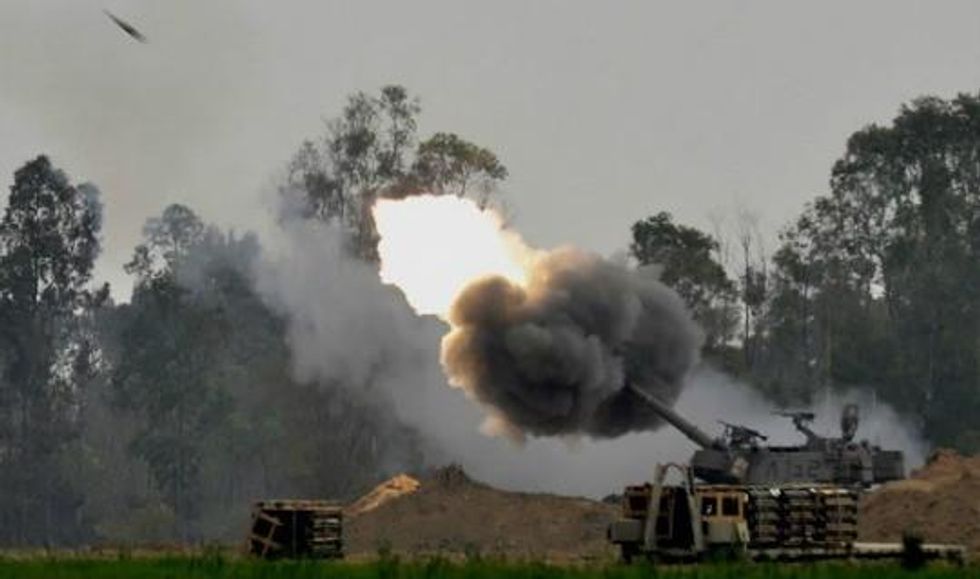Latest Bombings: 'One More Step' Towards War in Gaza?
Tensions on the rise as Israel launches dozens of airstrikes overnight

An ongoing exchange of missiles and rockets between Gaza militants and Israeli Defense Forces escalated over the course of the week, culminating in roughly 29 Israeli airstrikes overnight. IDF authorities say the airstrikes only targeted Hamas bases and Al-Quds Brigades forces, the armed wing of Islamic Jihad, but critics have long criticized Israel of engaging in disproportionate response when it comes to comparing the homemade rockets of Gaza militants to its much more advanced weaponry. Critics have also charged that Israeli strikes purportedly only targeting "militants" is nearly impossible in densely populated Gaza.
According to the Ma'an news agency in Gaza:
[Israel's overnight] bombardment, which injured three Palestinians, came in response to the firing of dozens of rockets by Islamic Jihad on Wednesday, which themselves were a response by the group to Israel's killing of seven Palestinians -- including three of the groups' members -- in separate incidents earlier in the week.
By late Thursday, tensions seem to have subsided though many remained concerned that the latest Israeli incursion could lead to wider escalation.
"Even if this latest escalation doesn't immediately break out into full-scale war, it's one more step on the way towards that path," writes Alex Kane at Mondoweiss. "That's because the Egyptian and U.S.-brokered ceasefire from 2012 between Palestinian militant groups--including Islamic Jihad and Hamas--has been threatened by repeated Israeli violations. And it's those Israeli violations that have provoked rocket fire into Israel."
The escalation arose as UK Prime Minister David Cameron visited to the region for the first time since taking office in 2010. Following his visit, Cameron issued a "gloomy assessment of the state of the Middle East peace process after two days of talks with Palestinian and Israeli leaders, saying a successful outcome was only possible, not probable," as the Guardian reports.
Leaders from Islamic Jihad said the two sides had reached a ceasfire on Thursday, a claim the Israeli Defense Forces denied.
______________________
An Urgent Message From Our Co-Founder
Dear Common Dreams reader, The U.S. is on a fast track to authoritarianism like nothing I've ever seen. Meanwhile, corporate news outlets are utterly capitulating to Trump, twisting their coverage to avoid drawing his ire while lining up to stuff cash in his pockets. That's why I believe that Common Dreams is doing the best and most consequential reporting that we've ever done. Our small but mighty team is a progressive reporting powerhouse, covering the news every day that the corporate media never will. Our mission has always been simple: To inform. To inspire. And to ignite change for the common good. Now here's the key piece that I want all our readers to understand: None of this would be possible without your financial support. That's not just some fundraising cliche. It's the absolute and literal truth. We don't accept corporate advertising and never will. We don't have a paywall because we don't think people should be blocked from critical news based on their ability to pay. Everything we do is funded by the donations of readers like you. Will you donate now to help power the nonprofit, independent reporting of Common Dreams? Thank you for being a vital member of our community. Together, we can keep independent journalism alive when it’s needed most. - Craig Brown, Co-founder |
Jacob Chamberlain is a former staff writer for Common Dreams. He is the author of Migrant Justice in the Age of Removal. His website is www.jacobpchamberlain.com.

An ongoing exchange of missiles and rockets between Gaza militants and Israeli Defense Forces escalated over the course of the week, culminating in roughly 29 Israeli airstrikes overnight. IDF authorities say the airstrikes only targeted Hamas bases and Al-Quds Brigades forces, the armed wing of Islamic Jihad, but critics have long criticized Israel of engaging in disproportionate response when it comes to comparing the homemade rockets of Gaza militants to its much more advanced weaponry. Critics have also charged that Israeli strikes purportedly only targeting "militants" is nearly impossible in densely populated Gaza.
According to the Ma'an news agency in Gaza:
[Israel's overnight] bombardment, which injured three Palestinians, came in response to the firing of dozens of rockets by Islamic Jihad on Wednesday, which themselves were a response by the group to Israel's killing of seven Palestinians -- including three of the groups' members -- in separate incidents earlier in the week.
By late Thursday, tensions seem to have subsided though many remained concerned that the latest Israeli incursion could lead to wider escalation.
"Even if this latest escalation doesn't immediately break out into full-scale war, it's one more step on the way towards that path," writes Alex Kane at Mondoweiss. "That's because the Egyptian and U.S.-brokered ceasefire from 2012 between Palestinian militant groups--including Islamic Jihad and Hamas--has been threatened by repeated Israeli violations. And it's those Israeli violations that have provoked rocket fire into Israel."
The escalation arose as UK Prime Minister David Cameron visited to the region for the first time since taking office in 2010. Following his visit, Cameron issued a "gloomy assessment of the state of the Middle East peace process after two days of talks with Palestinian and Israeli leaders, saying a successful outcome was only possible, not probable," as the Guardian reports.
Leaders from Islamic Jihad said the two sides had reached a ceasfire on Thursday, a claim the Israeli Defense Forces denied.
______________________
Jacob Chamberlain is a former staff writer for Common Dreams. He is the author of Migrant Justice in the Age of Removal. His website is www.jacobpchamberlain.com.

An ongoing exchange of missiles and rockets between Gaza militants and Israeli Defense Forces escalated over the course of the week, culminating in roughly 29 Israeli airstrikes overnight. IDF authorities say the airstrikes only targeted Hamas bases and Al-Quds Brigades forces, the armed wing of Islamic Jihad, but critics have long criticized Israel of engaging in disproportionate response when it comes to comparing the homemade rockets of Gaza militants to its much more advanced weaponry. Critics have also charged that Israeli strikes purportedly only targeting "militants" is nearly impossible in densely populated Gaza.
According to the Ma'an news agency in Gaza:
[Israel's overnight] bombardment, which injured three Palestinians, came in response to the firing of dozens of rockets by Islamic Jihad on Wednesday, which themselves were a response by the group to Israel's killing of seven Palestinians -- including three of the groups' members -- in separate incidents earlier in the week.
By late Thursday, tensions seem to have subsided though many remained concerned that the latest Israeli incursion could lead to wider escalation.
"Even if this latest escalation doesn't immediately break out into full-scale war, it's one more step on the way towards that path," writes Alex Kane at Mondoweiss. "That's because the Egyptian and U.S.-brokered ceasefire from 2012 between Palestinian militant groups--including Islamic Jihad and Hamas--has been threatened by repeated Israeli violations. And it's those Israeli violations that have provoked rocket fire into Israel."
The escalation arose as UK Prime Minister David Cameron visited to the region for the first time since taking office in 2010. Following his visit, Cameron issued a "gloomy assessment of the state of the Middle East peace process after two days of talks with Palestinian and Israeli leaders, saying a successful outcome was only possible, not probable," as the Guardian reports.
Leaders from Islamic Jihad said the two sides had reached a ceasfire on Thursday, a claim the Israeli Defense Forces denied.
______________________

